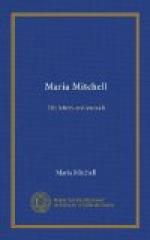“Concord, Mass., 1879. To establish a school of philosophy had been the dream of Alcott’s life; and there he sat as I entered the vestry of a church on one of the hottest days in August. He looked full as young as he did twenty years ago, when he gave us a ‘conversation’ in Lynn. Elizabeth Peabody came into the room, and walked up to the seat of the rulers; her white hair streamed over her shoulders in wild carelessness, and she was as careless as ever about her whole attire, but it was beautiful to see the attention shown to her by Mr. Alcott and Mr. Sanborn.
“Emerson entered,—pale, thin, almost ethereal in countenance,—followed by his daughter, who sat beside him and watched every word that he uttered. On the whole, it was the same Emerson—he stumbled at a quotation as he always did; but his thoughts were such as only Emerson could have thought, and the sentences had the Emersonian pithiness. He made his frequent sentences very emphatic. It was impossible to see any thread of connection; but it always was so—the oracular sentences made the charm. The subject was Memory.’ He said, ’We remember the selfishness or the wrong act that we have committed for years. It is as it should be—Memory is the police-officer of the universe.’ ’Architects say that the arch never rests, and so the past never rests.’ (Was it, never sleeps?) ’When I talk with my friend who is a genealogist, I feel that I am talking with a ghost.’
“The little vestry, fitted perhaps for a hundred people, was packed with two hundred,—all people of an intellectual cast of face,—and the attention was intense. The thermometer was ninety in the shade!
“I did not speak to Mr. Emerson; I felt that I must not give him a bit of extra fatigue.
“July 12, 1880. The school of philosophy has built a shanty for its meetings, but it is a shanty to be proud of, for it is exactly adapted to its needs. It is a long but not low building, entirely without finish, but water-tight. A porch for entrance, and a recess similar at the opposite end, which makes the place for the speakers. There was a small table upon the platform on which were pond lilies, some shelves around, and a few busts—one of Socrates, I think.
“I went in the evening to hear Dr. Harris on ‘Philosophy.’ The rain began to come down soon after I entered, and my philosophy was not sufficient to keep me from the knowledge that I had neither overshoes nor umbrella; I remembered, too, that it was but a narrow foot-path through the wet grass to the omnibus. But I listened to Dr. Harris, and enjoyed it. He lauded Fichte as the most accurate philosopher following Kant—he said not of the greatest breadth, but the most acute.
“After Dr. Harris’ address, Mr. Alcott made a few remarks that were excellent, and said that when we had studied philosophy for fifteen years, as the lecturer had done, we might know something; but as it was, he had pulled us to pieces and then put us together again.




